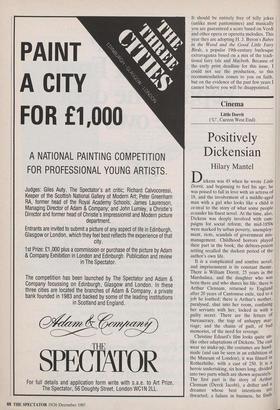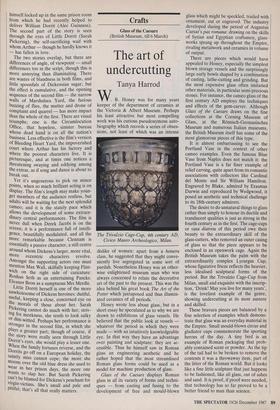Cinema
Little Dorrit (`U', Curzon West End)
Positively Dickensian
Hilary Mantel
Dickens was 45 when he wrote Little Dorrit, and beginning to feel his age; he was poised to fall in love with an actress of 18, and the involvement of a middle-aged man with a girl who looks like a child is central to the story of what some people consider his finest novel. At the time, also, Dickens was deeply involved with cam- paigns for social reform; the mid-1850s were marked by urban poverty, unemploy- ment, riots, scandals of government mis- management. Childhood horrors played their part in the book; the debtors-prison setting recalled the darkest period of the author's own life.
It is a complicated and sombre novel, and imprisonment is its constant theme. There is William Dorrit, 25 years in the Marshalsea, and the daughter who was born there and who shares his life; there is Arthur Clennam, returned to England after 20 years of Cantonese exile, tied to a job he loathed; there is Arthur's mother, paralysed, shut into her room, confining her servants with her, locked in with a guilty secret. There are the fetters of bureaucracy, the trap of unhappy mar- riage; and the chains of guilt, of bad memories, of the need for revenge.
Christine Edzard's film looks quite un- like other adaptations of Dickens. The cast wear no make-up, the costumes are hand- made (and can be seen in an exhibition at the Museum of London); it was filmed in Rotherhithe, with a cast of 250. It is a heroic undertaking, six hours long, divided into two parts which are shown separately. The first part is the story of Arthur Clennam (Derek Jacobi), a drifter and a dreamer whose best intentions are thwarted; a failure in business, he finds himself locked up in the same prison room from which he had recently helped to deliver William Dorrit (Alec Guinness). The second part of the story is seen through the eyes of Little Dorrit (Sarah Pickering), the self-sacrificing waif with whom Arthur — though he hardly knows it — has fallen in love.
The two stories overlap, but there are differences of angle, of viewpoint — small differences too in the script, though this is more annoying than illuminating. There are wastes of blandness in both films, and little spoonfuls of Dickensian sugar; but the effect is cumulative, and the opening sequence of the second film — the narrow walls of Marshalsea Yard, the furious buzzing of flies, the mutter and drone of complaint and quarrel — has more impact than the whole of the first. There are visual triumphs; one is the Circumlocution Office, that hopeless, sinister bureau whose dead hand is on all the nation's business. Less effective is the film's version of Bleeding Heart Yard, the impoverished court where Arthur has his factory and where the poorest characters live. It is picturesque, and at times one notices a threatening swaying and eddying among the extras, as if song and dance is about to break out.
Yet it's ungenerous to pick on minor points, when so much brilliant acting is on display. The film's length may make youn- ger members of the audience restless, but adults will be waiting for the next splendid cameo; and it is the stately pace which allows the development of some extraor- dinary central performances. The film is never dull when Derek Jacobi is on the screen; it is a performance full of intelli- gence, beautifully modulated, and all the more remarkable because Clennam is essentially a passive character, a still centre around whom Dickens's larger, more vital, more eccentric characters revolve. Amongst the supporting actors one must mention Max Wall, skilfully keeping Flint- wich on the right side of caricature: Roshan Seth as an entertaining Pancks: Eleanor Bron as a sumptuous Mrs Merdle. Little Dorrit herself is one of the more unwholesome of Dickens heroines: dutiful, useful, keeping a close, concerned eye on the morals of those about her. Sarah P. ickering cannot do much with her; striv- ing for meekness, she tends to look sulky or dim-witted. Perhaps her performance is stronger in the second film, in which she plays a greater part; though of course, if the story were really seen through Little Dorrit's eyes, she would play a lesser one. When the family fortunes reverse, and the Dorrits go off on a European holiday, the saintly miss cannot cope; the more she moons over the old blue dress she used to wear in her prison days, the more one wants to slap her. But Sarah Pickering can't be blamed for Dickens's penchant for virgin-victims. She's small and pale and pitiful; that's all that really matters.











































































































 Previous page
Previous page